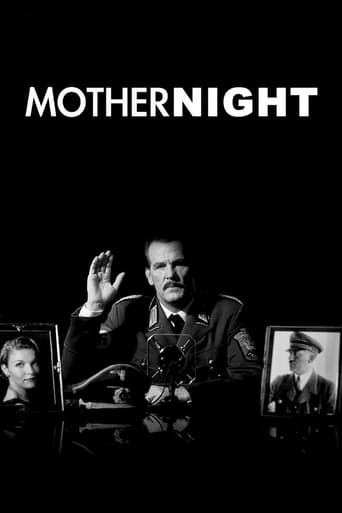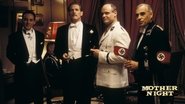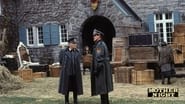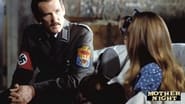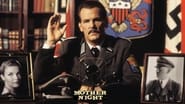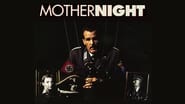tomsview
Kurt Vonnegut claimed that the film of "Mother Night" captured the spirit of his book so well that he could never think of Howard Campbell Jnr without visualising Nick Nolte in the part.Nick Nolte seems to get better with age. He is in nearly every scene of this film and sustains his character through the passage of more than thirty years.The story begins in 1960 with Howard Campbell Jnr awaiting trial in an Israeli prison for anti-Jewish broadcasts he made during the war. The Israeli authorities order him to write his memoirs and through narration and flashback his story is revealed.An American who grew up in pre-war Germany, Howard Campbell Jnr is a successful playwright when the Nazis come to power. Married to a leading German actress played by Sheryl Lee, he ignores the excesses of the Nazis by absorbing himself in work and love for his wife. Just before America enters the war, an agent, Frank Wirtanen played by John Goodman, convinces him to ingratiate himself with the Nazis in order to relay coded information to the Allies via radio broadcasts even though he will be regarded as a traitor by America and the truth will never be revealed.As cover for his espionage work, Campbell's broadcasts are vitriolic in their denunciation of the Jews and he becomes a hated figure among the Allies. At war's end, he is given a false identity and disappears back into American society. The story takes a number of unpredictable turns and ends with Campbell burnt out and disillusioned by a life over which he has had little control. He sums up his life with the philosophy that runs through the film, "You must be careful what you pretend to be, because in the end you are what you pretend to be".In his guise as a Nazi collaborator, Campbell's tirades against the Jews have the power to shock even in the context of this movie. Not unexpectedly this was where a few critics felt the movie stepped over the line of acceptability. To dismiss "Mother Night" in this way is to miss its power as a cautionary tale that does not insult the audience by delivering easy answers or a predicable plot.The film comes close to falling apart in the New York scenes featuring the neo-Nazis. Treated as caricatures, they almost capsize the story. However if the filmmakers had attempted a more serious approach with this material, apart from missing the Vonnegut touch, they may have produced a work of such oppressive gloom that the ironic tone that underpins the movie would have been lost.One scene in "Mother Night" stays in the memory. Crushed by the forces that have buffeted his life, Howard Campbell Jnr stops walking and remains motionless for hours in a crowded New York street, because, as he says, "There did not seem to be any direction in which I needed to go".Unique and challenging, "Mother Night" leaves an indelible impression, and Nick Nolte's performance is simply unforgettable.
Michael Fisher
If you've read Mother Night and enjoyed it so much (as I did) that you just have to see the movie, understand that you have to understand a fundamental element of Vonngut's writing - that beyond his story lies Vonnegut himself, and that you can't put a human mind on the screen. His whit and humor just cannot be transcribed by a screenplay or even the best acting performance. I believe that this movie exceeds in asking the key questions that Vonnegut poses in his book, but those frequent cynical moments of satire found on the page are not found on the screen. Does this mean that the movie misses the mark? Of course not. In my opinion, the movie succeeds because it does not try to recreate the experience of reading the book (this is not a medium for those too lazy to turn a page). It succeeds because it takes the fundamental elements of a story created by one of America's true artistic treasures and presents it in a a framework without pretense. I've seen other movie versions of Vonnegut books where the director obviously tries to channel Vonnegut's genius and loses grip on his own craft. I would not place this movie as one of the best I've seen, but it stands on its own legs as one well worth watching. By taking Vonnegut's "voice" out of the movie's narration or trying to insert it however it can, Mother Night tells his story brilliantly, and preserves the story's fundamental lessons without confusion, distraction, or disappointment.
edwagreen
Screenwriter Howard Campbell is recruited to serve in counter-espionage during World War 11. He moves to Nazi Germany and marries an actress whose family is faithful to their Fatherland. Campbell, portrayed well, by Nick Nolte broadcasts vitriolic propaganda for the Nazi Regime. Truth is that few people really know what Campbell is up to.The war ends and Campbell, with his wife presumed dead, heads to N.Y. for a new unassumed life. Here is where the picture falls apart. After several years, without anyone knowing him, Campbell assumes his real name.At this point, as stated, the film deteriorates into a series of unlikely events. A neighbor turns out to be a Communist spy. who notifies an Aryan supremacy group of Campbell's existence. The latter's dead wife suddenly shows up only to reveal later on that she is the sister of his dead wife. Still later, she is revealed to be a Communist as well. Too much is going on.Campbell eventually gives himself up and in flashbacks, sits in a cell and talks to Adolph Eichmann.We even have a suicide at the very end. I think this might have been to take the audience out of its agony from viewing all this.The picture really had a lot of emotionally sick people in it. At times, Campbell was so viciously good at reciting his anti-Jewish denunciations, you'd really begin to wonder if he meant it.
Jonny_Numb
American playwright Howard W. Campbell, Jr. (played with a musty obsolescence by Nick Nolte) lives happily in Germany with his actress wife, Helga Noth (Sheryl Lee) before the beginning of World War II. At the peak of his life, Howard is drafted by an American agent (John Goodman) to become a spy on behalf of the Allies; forewarned of the risks the job holds, Howard has everything to lose, but finds the offer irresistible. Following the death of his wife and the end of the war, Campbell camouflages himself with the anonymity of a solitary life in New York City, which muddies his neuroses even further. The central question (indeed, a question that has frustrated many critics) of the movie and Kurt Vonnegut's source novel is, "is Campbell a hero or a traitor?" Director Keith Gordon and screenwriter Robert B. Weide offer us clues, but no answer, and this ambiguity–this NOT knowing–is what keeps "Mother Night" fresh and interesting throughout. At the beginning of the film, Nolte portrays Campbell as intelligent and confident; by the end, he's either scared and uncertain, or scared and COMPLETELY certain of his contribution/debt to humanity for the role he played in the war. Gordon applies a certain icy sheen to the images of the film's first half, which complement his portrait of the Nazi bourgeoisie and captures Vonnegut's dramatic side. On the flip side, when Campbell is confined to his lonely New York apartment (which he affectionately calls "purgatory") only to be discovered by a group of Nazis, the humor produced also is purely distinctive of the author, and provides a temporary respite from the dramatic tension that unfolds. The moral (even spiritual) paradox "Mother Night" presents doesn't lend itself to simple resolution, and to a degree, should be left ambiguous–the black-and-white scenes of Campbell staring wearily into space as he is imprisoned in Israel suggest an unspoken contemplation we are not made privy to–as Campbell is a character whose inner workings we wind up knowing very little about; the war changes him, coming back to America changes him, and meeting up with the Nazis in New York compels him to prolong the facade of his "act" even further, to the point where he can only stare wearily at an image of himself projected on a wall, spewing anti-Semitic bile. Perhaps that's the best reaction we could hope for.
